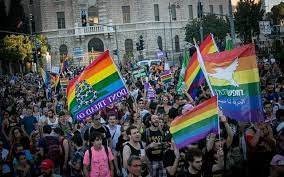Israeli Police breathed a collective sigh of relief as the Gay Pride and Tolerance Parade in Jerusalem concluded on June 1 without any disturbances. This year’s event marked a significant milestone, as it celebrated its 21st anniversary. With an estimated attendance of 10,000 people, the parade drew participants from various backgrounds and communities, emphasizing the importance of inclusivity and acceptance.
Securing the event was a significant operation, with approximately 2,000 personnel from the Israel Police and Israel Border Police ensuring the safety and smooth progress of the parade. Their presence provided reassurance to both organizers and participants, given the historical context of opposition and controversy surrounding the event.
The inception of the Jerusalem parade in 2002 faced considerable opposition, prompting petitions to the Israeli Supreme Court seeking to halt the parade. Detractors argued that the event was a desecration of Jerusalem and an affront to the city’s residents, regardless of their religious affiliation. The parade was seen by some as an insult to Jewish, Muslim, and Christian communities in Jerusalem and around the world.
Over the years, the parade has become a symbol of resilience and progress, challenging societal norms and advocating for LGBTQ+ rights. Its continued existence and successful organization serve as a testament to the evolving perspectives and growing acceptance within Israeli society.
Notably, the presence of prominent figures at the event added significance and support to the cause. Yair Lapid, the former Prime Minister and current leader of the Knesset opposition, and Benny Gantz, the former IDF Chief-of-Staff, delivered brief speeches, highlighting their commitment to promoting tolerance and equality. The attendance of Tom Nides, the U.S. Ambassador to Israel, further underscored the international recognition of the parade’s importance.
The peaceful and uneventful conclusion of the parade was a welcome outcome, as it allowed participants to express themselves freely and celebrate their identities without fear of disruption or violence. It also demonstrated the successful collaboration between law enforcement agencies and event organizers, ensuring a secure environment for all involved.
The Jerusalem parade’s significance extends beyond its immediate impact. By asserting the right to hold such an event in the heart of Jerusalem, a city of great religious and cultural significance, the parade sends a powerful message of inclusion and acceptance to the world. It serves as a reminder that progress in LGBTQ+ rights is possible even in the face of opposition and controversy.
As Israel moves forward, it is crucial to build on this positive momentum and continue the dialogue on equality and human rights. The success of the parade in Jerusalem serves as a beacon of hope, encouraging further conversations and actions that challenge discriminatory practices and promote acceptance across all communities.
Ultimately, the peaceful conclusion of the Gay Pride and Tolerance Parade in Jerusalem represents a triumph for LGBTQ+ rights and a step towards fostering a more inclusive and diverse society. It is a testament to the power of unity and the tireless efforts of individuals and organizations committed to creating a world free from discrimination and prejudice.


